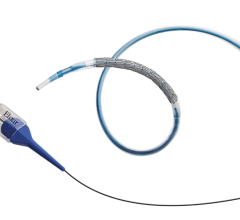October 23, 2007 – Boston Scientific Corp. announced five-year and final follow-up data from its TAXUS IV clinical trial demonstrated long-term safety, with no new cases of stent thrombosis between years four and five.
The benefits previously reported at years one through four – in patients who received a TAXUS Express Paclitaxel-Eluting Coronary Stent compared to patients who received a bare-metal stent (BMS) – were maintained at five years. Stephen G. Ellis, M.D., the trial’s co-principal investigator and director of the Cleveland Clinic’s Sones Cardiac Catheterization Laboratories, presented the TAXUS IV five-year results at the annual Transcatheter Cardiovascular Therapeutics (TCT) symposium in Washington, D.C.
“The five-year TAXUS IV follow-up study of the TAXUS Express Stent clearly demonstrates long-term safety, with similar rates of death, myocardial infarction, and stent thrombosis across a broad cross section of patients and lesions and with no new cases of stent thrombosis between years four and five,” said Gregg W. Stone, M.D., of Columbia University Medical Center and the Cardiovascular Research Foundation, New York, the Principal Investigator for the TAXUS IV clinical trial. “The TAXUS IV data combined with the TAXUS II results presented in September clearly add to the growing body of evidence reinforcing the long-term safety of TAXUS paclitaxel-eluting stents.”
The results of TAXUS IV reaffirm the long-term safety of the TAXUS Stent as demonstrated by an excellent five-year safety profile. Rates of all death (10.0 percent vs. 11.2 percent, p=0.49), cardiac death (4.4 percent vs. 4.5 percent, p=0.85), and all death and Q-wave myocardial infarction (10.9 percent vs. 12.0 percent, p=0.57) were numerically lower in the TAXUS Stent group compared to the BMS group. The five-year rates of cardiac death and Q-wave myocardial infarction were identical between the TAXUS Stent and the control BMS (5.3 percent vs. 5.3 percent, p=0.96). Using the broader ARC definition of definite/probable, the TAXUS IV trial reported no cases of stent thrombosis between years four and five for the TAXUS Stent and one incidence of stent thrombosis for the BMS control group (0.0 percent vs. 0.2 percent, p=0.50), with a cumulative rate of stent thrombosis rate through five years being identical -- 2.5 percent for the TAXUS Stent and 2.5 percent for BMS (p=0.94).
“With the recent reversal of the SCAAR study, positive results from the Ontario database and excellent five-year data reported for TAXUS II and now TAXUS IV, the TAXUS Stent System has firmly established an outstanding long-term safety and efficacy record as evidenced by clinical trial data now reporting out to five years,” said Paul LaViolette, Chief Operating Officer of Boston Scientific. “Also noteworthy is that the slow-release paclitaxel-eluting TAXUS Stent continues to demonstrate its effectiveness in preventing restenosis, or additional procedures, out to five years across a wide variety of patients and lesions.”
The TAXUS IV five-year results support the long-term effectiveness of the TAXUS Stent with marked target lesion revascularization (TLR) reduction across a broad cross section of patients and lesions. When compared to BMS, the TAXUS Stent reduced the five-year rates of TLR by 56 percent (9.1 percent vs. 20.5 percent, p
TAXUS IV is a randomized, double-blind pivotal trial designed to assess the safety and efficacy of a paclitaxel-eluting coronary stent system in reducing restenosis in de novo lesions 10-28 mm in length and 2.5-3.75 mm in diameter. The study, which enrolled 1,326 patients at 73 sites in the United States, had 95 percent follow-up at five years for both the paclitaxel-eluting stent and BMS populations (618 patients treated with the TAXUS Stent and 612 patients treated with BMS). The primary endpoint of the TAXUS IV clinical trial was TVR, or re-intervention, at nine months.
For more information: www.bostonscientific.com


 July 02, 2024
July 02, 2024 









